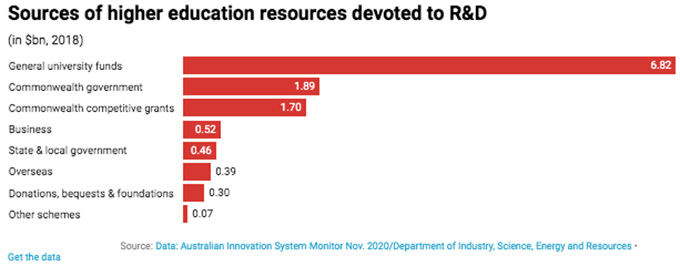 Research commercialisation in Australia has been getting more attention recently, but researchers face major obstacles to achieving this. If Australia wants to get serious about commercialising research knowledge, then we have to look seriously at the obstacles and incentives for researchers.
Australia’s gross spending on research and development (R&D) funding has been in the lower half of OECD nations for the past 20 years. It peaked in 2008 and has been declining since then. This is the important context of recent federal budget announcements encouraging research commercialisation.
Universities and quality research production are suffering as part of this decline. It also helps to explain why international student income has been so important to modern day Australian universities and 27% of all university revenue in 2019 before COVID.
Research commercialisation in Australia has been getting more attention recently, but researchers face major obstacles to achieving this. If Australia wants to get serious about commercialising research knowledge, then we have to look seriously at the obstacles and incentives for researchers.
Australia’s gross spending on research and development (R&D) funding has been in the lower half of OECD nations for the past 20 years. It peaked in 2008 and has been declining since then. This is the important context of recent federal budget announcements encouraging research commercialisation.
Universities and quality research production are suffering as part of this decline. It also helps to explain why international student income has been so important to modern day Australian universities and 27% of all university revenue in 2019 before COVID.
What are the obstacles for academics?
Research commercialisation can’t occur without research being completed first. Universities are now at increased risk of losing critical research capacity. They are facing a compounded COVID-induced crisis of falling international student revenue, sliding research funding, increased competition for available funding and insecure employment. Universities are no longer treated as valuable public institutions of public good despite legislation enshrining this status. Academia today, particularly in research focused positions, is like being self-employed in a large institution. The current senior academic is unlikely to have tenured secure employment. The workforce is increasingly comprised of casual and fixed-term appointments.
The majority of their time is now spent writing grant applications and applying for research funding at the cost of actually producing innovative, high quality research. The largest source of industry-focused federal funding, through Australian Research Council linkage grants, don’t even support the salaries of chief or partner investigators.
This is in sharp contrast to other OECD nations. It’s no coincidence that Israel, with the highest proportion of research and development funding in the world, has one of the most successful research commercialisation models. Sales of products based on research by the Hebrew University of Jerusalem alone exceeds A$2 billion a year. Coincidentally, over 50% of the population of Israel has also been vaccinated for COVID-19 and the country is one of the first to approach herd immunity.
It is critical to understand good research is the foundation for any future patent development. “Patent box” tax incentives with reduced tax rates are too far downstream to support development of research innovation and commercialisation.
Universities are no longer treated as valuable public institutions of public good despite legislation enshrining this status. Academia today, particularly in research focused positions, is like being self-employed in a large institution. The current senior academic is unlikely to have tenured secure employment. The workforce is increasingly comprised of casual and fixed-term appointments.
The majority of their time is now spent writing grant applications and applying for research funding at the cost of actually producing innovative, high quality research. The largest source of industry-focused federal funding, through Australian Research Council linkage grants, don’t even support the salaries of chief or partner investigators.
This is in sharp contrast to other OECD nations. It’s no coincidence that Israel, with the highest proportion of research and development funding in the world, has one of the most successful research commercialisation models. Sales of products based on research by the Hebrew University of Jerusalem alone exceeds A$2 billion a year. Coincidentally, over 50% of the population of Israel has also been vaccinated for COVID-19 and the country is one of the first to approach herd immunity.
It is critical to understand good research is the foundation for any future patent development. “Patent box” tax incentives with reduced tax rates are too far downstream to support development of research innovation and commercialisation.
Provide more direct support for commercialisation
There is currently no direct federal research funding to support research commercialisation in Australia. Universities must direct their own funding into start-up support or research commercialisation activity. That’s on top of funding teaching and internal research grants. Uniquest’s record of commercialising research at the University of Queensland shows all research (not just biomedical or STEM) can be successfully commercialised with proper support. It’s a research commercialisation company specialising in global technology transfer. Supporting this activity are professional staff with expertise in business, legal, copyright, intellectual property and partnership development. This sort of expertise is critical for connecting research knowledge to industry. In the case of UQ, it might also have influenced the Australian government’s decision to invest in the COVID vaccine trial.Technology transfer offices are common in universities across North America and Europe but are rare in Australia. However, they must be linked to effective organisational practices to be successful. Better incentives are needed to connect industry to research development beyond the basic tax incentives that are more attractive to large companies. Small and medium businesses have struggled to survive through COVID. They have no time to come looking for research innovation at universities or battle through complex negotiations over intellectual property. This is why new research funding schemes are needed. These would provide direct funding to support the co-production of research with industry. This research would be designed to solve problems of society and industry and be customised to produce commercialised solutions.BREAKING: Clinical trial results show the aborted University of Queensland COVID-19 vaccine would have been among the best in the world, generating an immune response in 99 per cent of patients it was tested on. https://t.co/4bGqxpAvzZ
— The Australian (@australian) April 19, 2021
Improve incentives for researchers
Academic career progression is still dominated by outcomes in research funding and peer-reviewed publications. Only recently has the importance of engagement with industry been acknowledged. This is in stark contrast to research commercialisation activities and partnerships which are time-consuming, not supported by national funding schemes and not measured by current academic KPIs. Research translation (let alone research impact or research commercialisation) isn’t even officially recognised as research activity in the Commonwealth Higher Education Research Data Collection of research activities and income. It’s not surprising, then, that only 2.3% of publications from Australia have industry co-authors.National change is needed to create a pipeline of research commercialisation. More research and development tax incentives won’t drive this change. Australia still lacks a coherent framework of research impact. Knowledge translation remains focused on traditional academic publications and conference presentations. Current definitions of research impact provide the bare minimum outcome of research contributing to economic, social, environmental or cultural benefit outside the academy and we have to do better. Trials of a research impact framework have stalled since 2018. Universities and research knowledge are of benefit to all in society not just those who work in the institutions and epidemiology partnering with government through COVID-19 has been a great example of research impact at work.#AcademicTwitter | A new report by the @australian found that @ANUmedia and @UniofAdelaide work more with industry in their published research than any other universities in Australia! As a state, SA rates highly in university-industry collaboration. More: https://t.co/8bdzStRtYH pic.twitter.com/G3Jju3Ur26
— Faculty of ECMS (@ecms_uofa) October 29, 2020